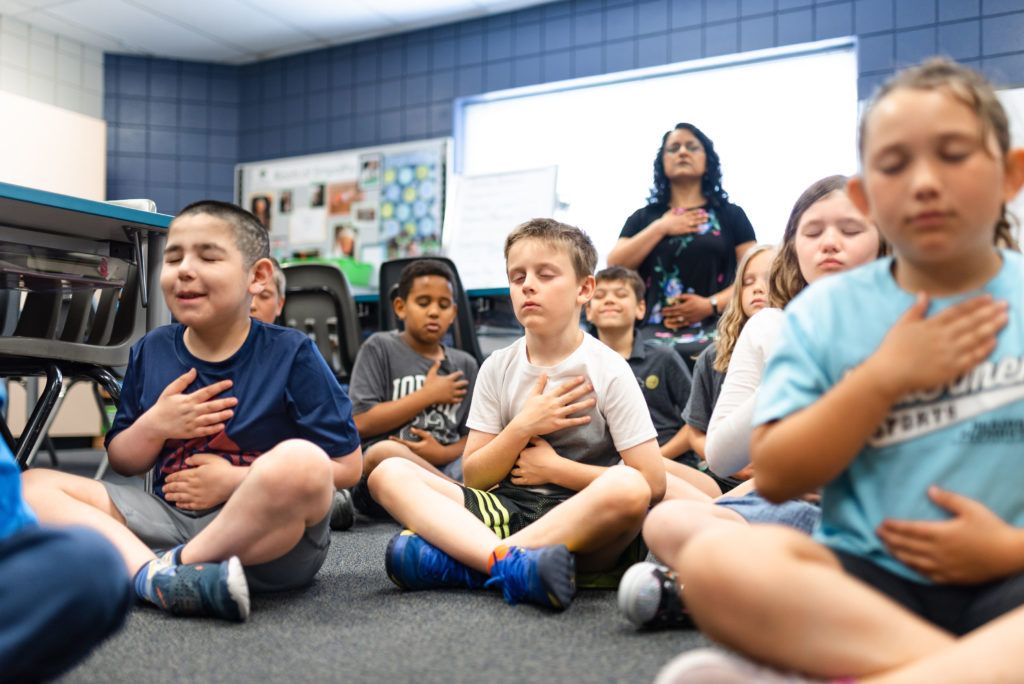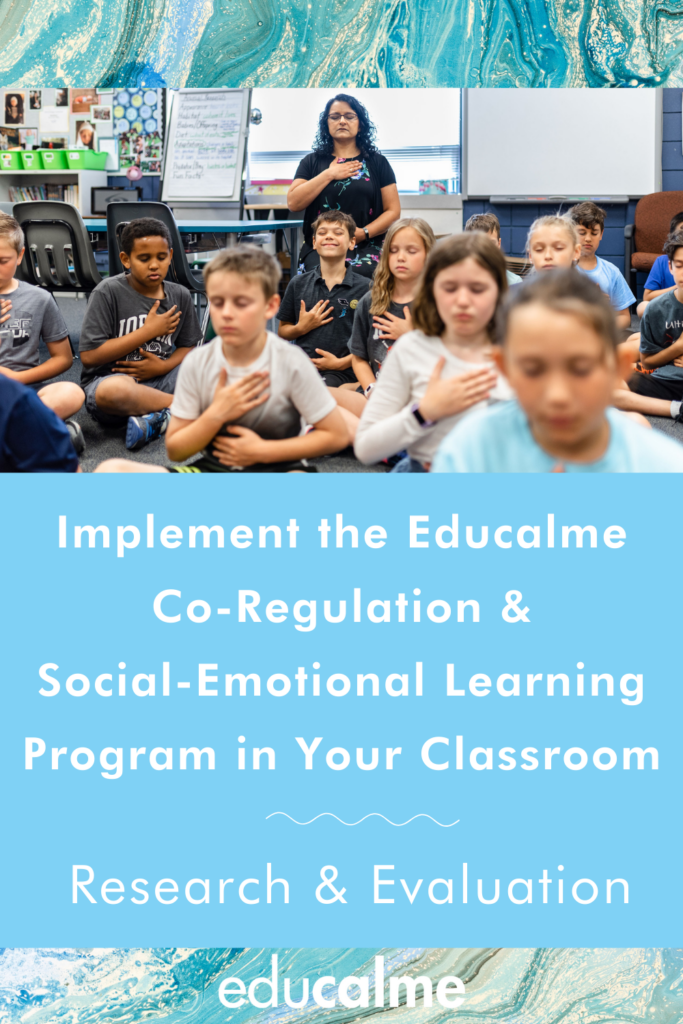Educalme is an online, ready-to-use, bilingual (English & French) daily co-regulation program for K-12 students and their teachers. The Educalme program guides students and teachers through a daily mindfulness practice that builds coping strategies, self-regulation, growth mindset, emotional intelligence, compassion, focus and more (Health in Common, 2020). This program improves student and teacher wellbeing by creating a trauma-informed classroom environment that fosters positive behaviour and academic achievement.
Mindfulness is the practice of intentionally focusing on one thing at a time. Practicing mindfulness gives students and teachers coping strategies for stressful experiences and emotions. It has been shown to create significant improvements in mood (Dariotis et al. 2016) (Bluth et al. 2016). Studies show that practicing mindfulness can reduce symptoms of stress, anxiety and depression in teachers (Harris, A.R. et al. 2016) and in children (Black, D.S 2016).

Practicing mindfulness helps children to increase attention and self regulatory skills (Poehlmann-Tynan et al. 2016). It also appears to improve student academic engagement (Singh et al. 2016) and achievement (Bakosh et al. 2016). More mindfulness was shown to correlate with better academic performance, fewer suspensions from school, and less stress in middle school students according to two MIT research studies (Caballero et al. 2019) (Bauer et al. 2019).
Practicing mindfulness daily can support teacher and student wellbeing and functioning (Harris et al. 2016). Furthermore, teachers that follow a mindfulness program report more adaptive strategies for coping with job stress (Taylor, et al., 2016).
A third-party evaluation of Educalme demonstrated that this program improves self-regulation, focus, resilience, classroom management and more. Qualitative, quantitative and narrative data collected from Educalme users demonstrates that this program creates the outcomes observed in the peer reviewed studies cited above (Health in Common, 2020). The Educalme program is evidence based.
The Collaborative of Academic, Social and Emotional Learning (CASEL) defines social and emotional learning (SEL) as “the process through which all young people and adults acquire and apply the knowledge, skills, and attitudes to develop healthy identities, manage emotions and achieve personal and collective goals, feel and show empathy for others, establish and maintain supportive relationships, and make responsible and caring decisions” (Collaborative for Academic, Social, and Emotional Learning, 2022).
Research shows that well-implemented, evidence-based social-emotional learning (SEL) programs are the most effective way to support young people’s success and wellbeing (Collaborative for Academic, Social, and Emotional Learning, 2022).
Educalme addresses all five of the SEL core competence areas outlined in the Collaborative for Academic, Social, and Emotional Learning (CASEL) framework: self-awareness, self-management, social awareness, relationship skills, and responsible decision-making (Collaborative for Academic, Social, and Emotional Learning (CASEL), 2022).
Educalme is created by trained and experienced teachers. Each unit in the Educalme program is influenced by current research and best practices in education, neuroscience and psychology. See below for a short list of literature that influenced the development of the Educalme curriculum.
The intention of Educalme is to improve the wellbeing and the teaching and learning environment for students, teachers and school communities by providing ready-to-use social-emotional learning, mindfulness and co-regulation exercises. Through the 5-minute daily lessons, students and teachers will develop their self-regulation skills, coping strategies, emotional intelligence, focus, resilience, behaviour management, classroom and time management and more. Improving these skills using the Educalme program was shown to improve academic performance in students (Health in Common, 2020).
Teachers do not need training to use Educalme. They learn alongside their students by pressing play on the daily lessons. They also have the option to use the printable, ready-to-use, additional learning resources to connect the learning outcomes of the Educalme lessons to their regular teaching curriculum.
To learn more about Educalme, go to https://www.educalme.com/classroom/
To download a condensed version of this article as a pdf, click here.

Bakosh, L. S., Snow, R. M., Tobias, J. M., Houlihan, J. L., & Barbosa-Leiker, C. (2016). Maximizing mindful learning: mindful awareness intervention improves elementary school students’ quarterly grades. Mindfulness.
Bauer, C. C. C., Caballero, C., Scherer, E., West, M. R., Mrazek, M. D., Phillips, D. T., . . . Gabrieli, J. D. E. (2019). Mindfulness training reduces stress and amygdala reactivity to fearful faces in middle-school children. Behavioral Neuroscience. Advance online publication.
Bluth, K., Campo, R. A., Pruteanu-Malinici, S., Reams, A., Mullarkey, M., & Broderick, P. C. (2016). A school-based mindfulness pilot study for ethnically diverse at-risk adolescents. Mindfulness.
Caballero, C. , Scherer, E. , West, M. R., Mrazek, M. D., Gabrieli, C. F. and Gabrieli, J. D. (2019), Greater Mindfulness is Associated With Better Academic Achievement in Middle School. Mind, Brain, and Education, 13: 157-166. doi:10.1111/mbe.12200
Collaborative for Academic, Social, and Emotional Learning (CASEL). (2022, January 21). Program Guide. Retrieved from CASEL: https://pg.casel.org/
Dariotis, J. K., Mirabal-Beltran, R., Cluxton-Keller, F., Feagans Gould, L., Greenberg, M. T., & Mendelson, T. (2016). A qualitative evaluation of student learning and skills use in a school-based mindfulness and yoga program. Mindfulness.
D.S. Black Mindfulness training for children and adolescents: A state-of-the-science review
K.W. Brown, J.D. Creswell, R.M. Ryan (Eds.), Handbook of mindfulness: Theory, research, and practice, New York, NY, Guilford (2016)
Harris, A.R., Jennings, P.A., Katz, D.A. et al. (2016) 7: 143 Promoting Stress Management and Wellbeing in Educators: Feasibility and Efficacy of a School-Based Yoga and Mindfulness Intervention. Mindfulness.
Harris, A. R., Jennings, P. A., Katz, D. A., Abenavoli, R. M., & Greenberg, M. T. (2016). Promoting stress management and well-being in educators: outcomes of the CALM intervention. Mindfulness.
Health in Common. (2020, August 6). Educalme Classroom: Summary of Ambassador Feedback (2019-2020). Winnipeg, Manitoba, Canada: Health in Common.
Poehlmann-Tynan, J., Vigna, A. B., Weymouth, L., Gerstein, E. D., Zabransky, M., Lee, P., & Zahn-Waxler, C. (2016). A pilot study of contemplative practices with economically disadvantaged preschoolers: children’s empathic and self-regulatory behaviors.
Singh, N. N., Lancioni, G. E., Karazsia, B. T., Felver, J. C., Myers, R. E., & Nugent, K. (2016). Effects of Samatha meditation on active academic engagement and math performance of students with attention deficit/hyperactivity disorder. Mindfulness.
Taylor, C., Harrison, J., Haimovitz, K., Oberle, E., Thompson, K., Schonert-Reichl, K., & Roeser, R. W. (2016). Examining potential mechanisms of stress reduction in a mindfulness-based intervention for school teachers: results from a randomized-control trial. Mindfulness.